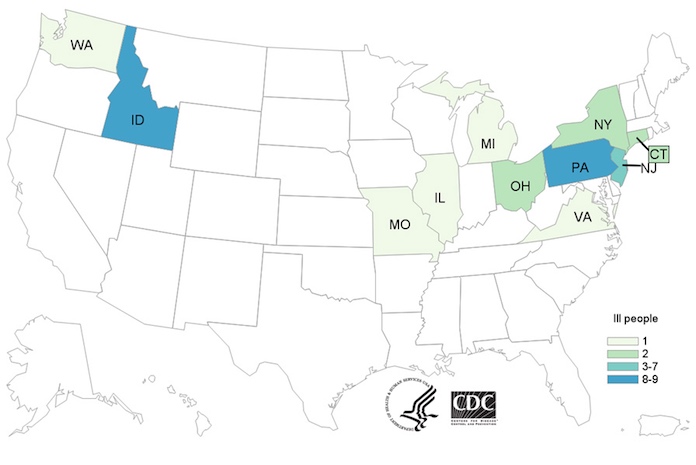The Centers for Disease Control and Prevention just announced that the E. coli O157:H7 outbreak they have been investigating is now linked to chopped romaine lettuce from the Yuma, Arizona region. As of April 12, 2018, 35 people in 11 states are sick with the outbreak strain. Twenty-two of those patients have been hospitalized; three patients have developed hemolytic uremic syndrome (HUS), a type of kidney failure.

No common growers, supplier, distributor, or brand has been identified so far, but government officials recommended that anyone, anywhere in the country, who has purchased chopped romaine lettuce, including salads and salad mixes containing that green, should throw it away. If you aren’t sure where the lettuce came from, get rid of it.
Discard it even if some of it has been eaten and no one has gotten sick. E. coli bacteria can cluster in tiny areas in these products and will not contaminate every leaf. It only takes 10 E. coli O157:H7 bacteria to make someone sick.

Attorney Fred Pritzker said, “There have been E. coli O157:H7 outbreaks linked to romaine lettuce and leafy greens in the past; in fact, those items are the most common source of foodborne illness. The lawyers in our firm are investigating this outbreak.” Contact him at 1-888-377-8900 or 612-338-0202.
This outbreak started in New Jersey; seven people in that state were sickened in an outbreak last month. Officials suspected a restaurant chain. No official has mentioned that chain since, but most of those patients interviewed said they ate chopped romaine from a restaurant.
The lettuce that may be linked to this outbreak apparently came from the Yuma, Arizona growing region. If you are going to purchase chopped romaine, ask the retailer or restaurant if it was grown in that part of the country. If the retailer can’t confirm it is not from Yuma, Arizona, do not eat it.
The patient case count by state is: Connecticut (2), Idaho (8), Illinois (1), Michigan (1), Missouri (1), New Jersey (7), New York (2), Ohio (2), Pennsylvania (9), Virginia (1), and Washington (1). The patient age range is from 12 to 84 years. Any illnesses that occurred after March 27, 2018 may not yet be reported, so this outbreak is likely to grow.
Of the 28 people interviewed in this outbreak, twenty six, or 93%, said they ate romaine lettuce the week before they got sick. That is a significantly higher percentage than people in a survey, in which 46% of healthy people ate romaine. Most of the patients said they ate a salad at a restaurant; romaine lettuce was the only common ingredient identified. The restaurants used chopped, bagged romaine lettuce. No ill persons have reported eating whole heads or hearts of romaine.
The symptoms of an E. coli infection include severe and painful abdominal cramps, and diarrhea that is usually bloody or watery. These symptoms appear a few days to a week after exposure to the bacteria. The symptoms of HUS include little urine output, lethargy, pale skin, easy bruising, and a skin rash. Anyone who is experiencing any of these symptoms should see a doctor as soon as possible.
Pritzker Hageman, America’s food safety law firm, successfully represents people harmed by adulterated food products in outbreaks throughout the United States. Its lawyers have won hundreds of millions of dollars for survivors of foodborne illness, including the largest verdict in American history for a person harmed by E. coli and hemolytic uremic syndrome. The firm also publishes Food Poisoning Bulletin, a respected source for food safety news and information. Pritzker Hageman lawyers are regularly interviewed by major news outlets including CNN, the New York Times, and the Wall Street Journal.




